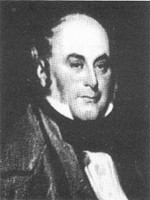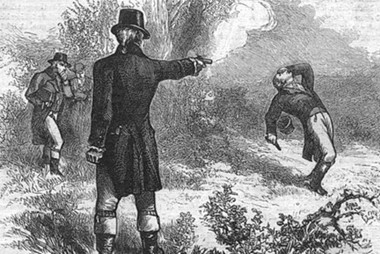|
 |
Charles
Tennyson
1784-1861
|
People in public life today make
many unpopular statements but if they are offensive they can apologise to
the person concerned. In past times, however, they were likely to be
challenged to a duel, a confrontation with chosen weapons based on a code
of honour.
Duels were fought not so much to kill the opponent as to gain
satisfaction, that is to restore one's honour by demonstrating a
willingness to risk one's life for it. The tradition of duelling was
therefore reserved for the male members of the nobility although in later
times it also extended to those of the upper classes, often with a sword
as the chosen weapon and later pistols.
Although duelling in most countries was illegal from the early 17th
century, the authorities frequently turned a blind eye although it was not
until 1852 that the last fatal duel took place in England. Many famous
people from history fought duels including two prime ministers, William
Pitt the Younger (1798) and the Duke of Wellington (1829), and in 1831,
Charles Tennyson, uncle of the poet, Alfred Lord Tennyson, found himself in such a
situation.
Tennyson, a landowner and politician, had just been elected M P for Stamford, a constituency that
included Bourne, after defeating
Lord Thomas Cecil, son of the second Marquess of Exeter, of Burghley
House, Stamford, in a particularly acrimonious contest, and during a grand victory banquet he made a speech that was
widely reported in the newspapers, in which he called Lord Thomas "a
tyrant", a reference to his family's influence over the people of Stamford
for many generations in what was construed to be disparaging terms.
Lord Thomas took offence claiming that Tennyson had accused his
family of “invading the rights of the people” and he refuted these
allegations during a speech at a public dinner in Stamford on June 14th
that year but Tennyson refused to withdraw them, resulting first in an
exchange of letters and ultimately a duel with pistols.
The confrontation was subsequently held at Wormwood Scrubs at six o’clock
on the afternoon of Saturday 17th June where the two men gathered with
their seconds, Lord Thomas Cecil being attended by Lord James Fitzroy and
Tennyson by Sir William Ingilby, M P for the Lindsey division of Lincolnshire.
Reporting the events that followed, the
Grantham Journal said: “After exchanging shots, Sir William expressed
himself satisfied on the part of Mr Tennyson and Lord James Fitzroy said
that Lord Thomas Cecil was satisfied; and the affair being thus terminated
to the honour of all parties, a conversation ensued in which Mr Tennyson
having expressed his regret that any expressions of his should have been
painful to Lord Thomas Cecil’s feelings, and expressed his hope that they
would have no further cause of difference, he and Lord Thomas Cecil shook
hands and the parties left the ground with the full understanding that all
points of dispute were finally disposed of.”
Because of the illegality of the confrontation, the two duellists and
their seconds were arrested by the police immediately after leaving the
shooting ground and taken into custody, first to Paddington police station
and then before a magistrate at Marylebone. Here, the court was told that
the duel had already taken place and that the two parties were now
reconciled and instead of being bound over to keep the peace, which would
have been the usual procedure, the case was dismissed.
Tennyson, who had already been M P for Great Grimsby and Bletchingly, continued as M P for Stamford for another year and in 1832 he was
elected as member for Lambeth where he remained until 1852. He was also a
Fellow of the Royal Society (1829) and a
published poet (1850).
In 1832, he was made a Privy Councillor and
gloried in the title of the Right Honourable for the rest of his life. As
a result, he was often the subject of a good deal of banter on account of
his pomposity and even his wife, Frances, referred to him as the Right Hon
while his eldest and favourite daughter, Julia, once addressed him as Dear
Right Honourable Daddy.
On the death of his father in 1835, Tennyson added the name d'Eyncourt to
commemorate the descent he claimed from Norman barons and in anticipation
of the peerage he expected to be granted at Queen Victoria's Coronation in
1838, he built the castellated 60-roomed Bayons Manor at Tealby. He died in 1861, aged 77.

Newspaper engraving of a duel from the 19th century.
See also The duel
that failed

Go to:
Main Index Villages
Index
|

